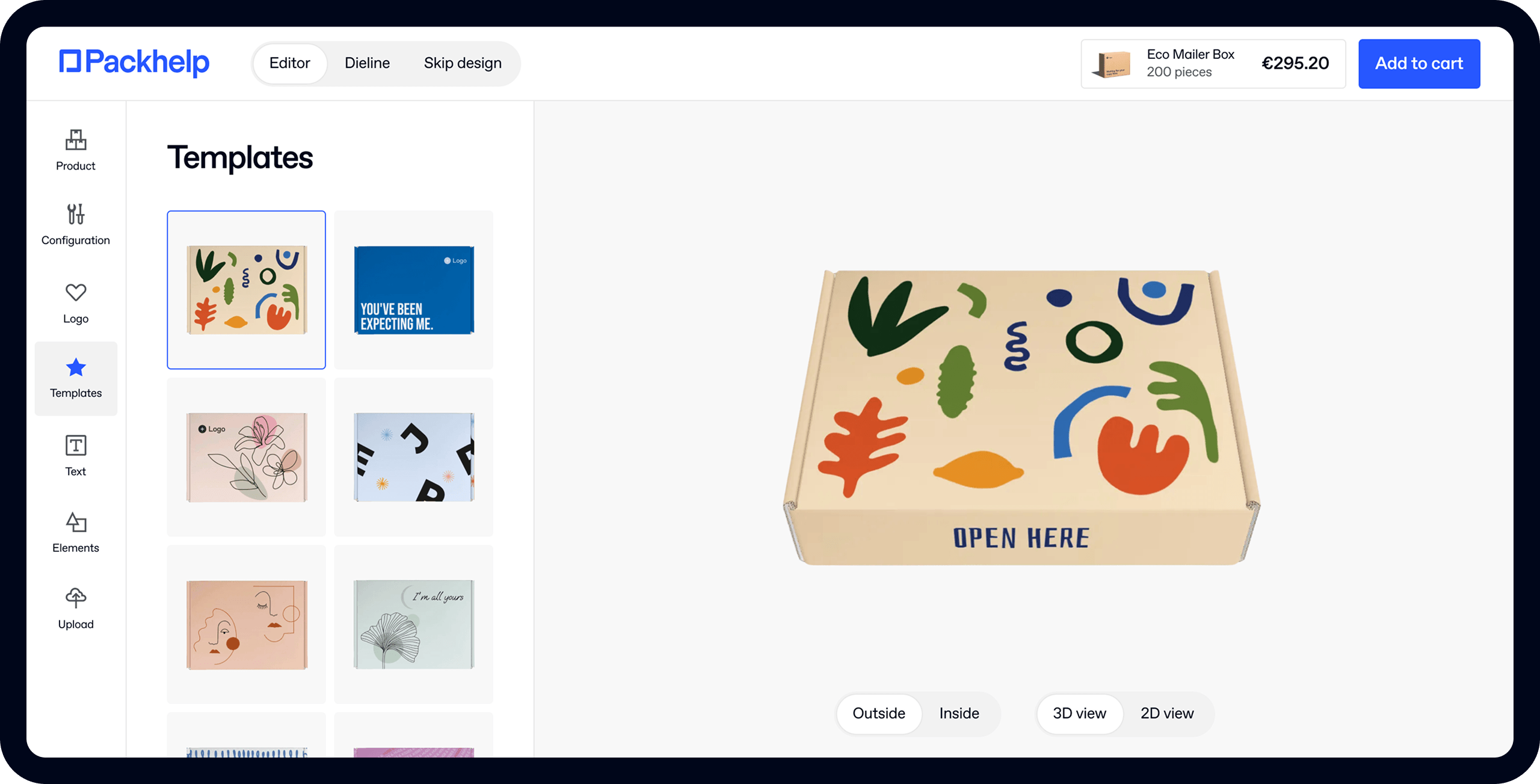What UK Recycling Symbols Actually Mean, With Downloadables

- 200+ templates & patterns
- Real time 3D packaging preview
- Upload logo and choose brand colours
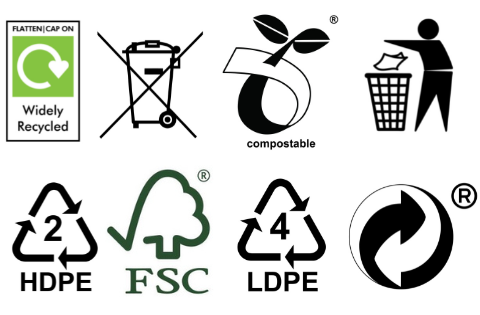
Subscribe now! Receive 15% discount.
Don’t miss out – get 15% off your first order when you join the newsletter. It’s fast, free, and kinda smart.
You're now subscribed!
In this article:
The UK has a variety of different recycling symbols that are used to help consumers identify which items can be recycled.
These symbols are usually found on the packaging of products and can be very helpful in determining the correct way to dispose of the products and packaging.
Whether you’re a consumer or a business, you’re very likely to start seeing more and more logos on your packaging.
As sustainable packaging and the recycling of packaging becomes more important to brands and consumers alike, more certifications will be used to show that a packaging product isn’t greenwashing.
Correct usage of these logos not only helps the recovery and recycling of packaging but helps you build a better rapport with your customer.
If you’re looking for UK recycling symbols to download and use in your packaging design, you’re in the right place.
Download these recycling logos in JPG or vector format, and you can use them in your packaging design.
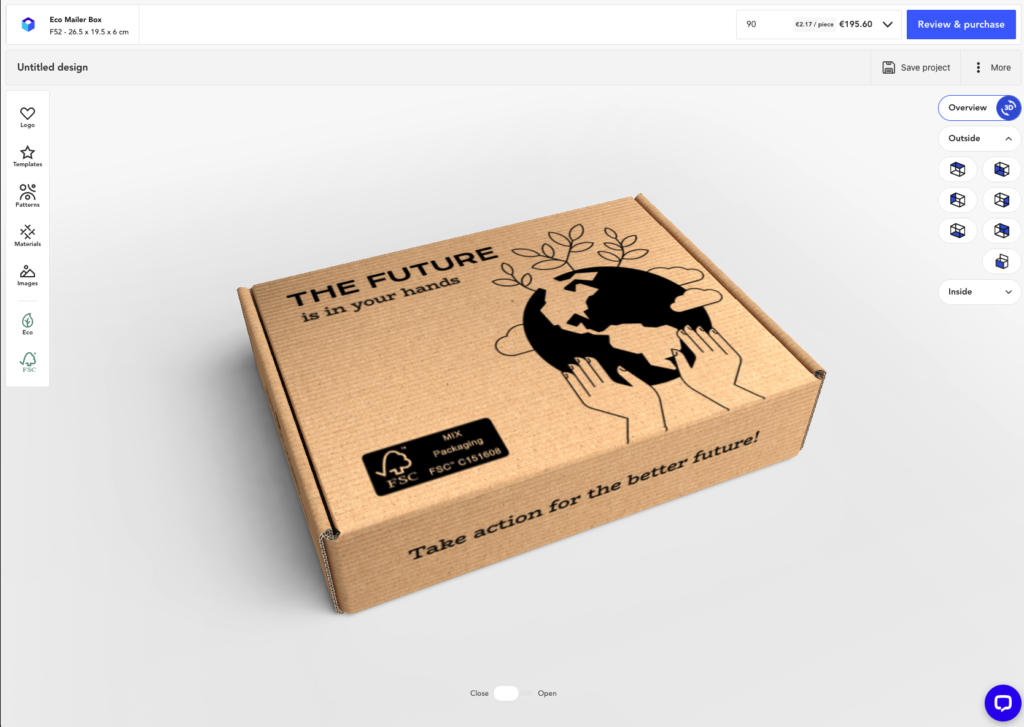
If you’re interested in designing packaging, use Packhelp’s online designers and you can add your recycling logos directly to your packaging design.
Start designing your packaging online with these logos.
Use these recycling symbols correctly.
The following symbols are copyrighted.
While they're provided here for free download, you must seek the correct permissions from the copyright holder or governing body. Many of these symbols require your product, packaging and/or business to meet specific criteria to use them.
The responsibility of using these symbols truthfully and correctly falls on you.
Packhelp takes no responsibility for incorrect or unlawful use of the symbols supplied below. Packhelp also takes no responsibility for losses or damages resulting in the incorrect use of these symbols on your packaging, products or documentation.
Don't hesitate to contact us directly for personalised help on how to use them on your packaging design correctly.
It's also important to note that the symbols on products and packaging are easily confused. For example, perfume packaging requirements contain information about both the primary and tertiary packaging, as well as the liquid itself.
There are also requirements involving your packaging design and materials to be aware of. For instance, packaging for fitness supplements needs to be compliant with products intended for consumption.
It's hard to tell if a symbol means that the product of the packaging can or cannot be recycled at times.
Generally, symbols on packaging relate to recycling the packaging unless noted.
Recycling schemes in the UK vs EU
When the UK left the EU, it kept some of its own recycling infrastructure and laws.
While there have been changes to both UK and EU laws since the UK left, recycling of packaging in Europe and the UK is generally quite similar.

Packaging in some European countries meets the UK's restrictions for kerbside collection and can be accepted for recycling, whereas some can't.
Always check with local authorities to ensure your packaging meets both EU and UK regulations.
Consider working with a packaging engineer who can create packaging for recycling in both the EU and UK, based on a thorough understanding of the regulations in both jurisdictions.
UK recycling symbols explained
Here's a quick overview and illustration of the common recycling symbols in the UK and the option to download the symbols in vector or jpg format.
Use this section to quickly surmise which symbols are relevant and applicable to your product, packaging or business.
Mobius loop

The most well-known recycling logo indicates that this form of packaging or the product itself is recyclable in some way.
Mobius loop (with %)

As above, but also denotes the percentage of the packaging product is made from recycled material.
NOTE: Please download the standard recycling logo and edit it to put your own percentage in the middle.
The Green Dot

This logo signifies that this producer has contributed toward recyclable packaging, but it doesn't necessarily mean that the packaging itself is recyclable.
Using this symbol on packaging requires written permission.
Tidy man
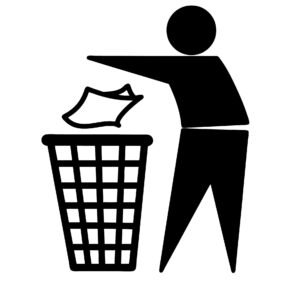
Keep Britan Tidy's symbol as a reminder not to litter.
Waste electricals

This electrical item should not be disposed of in the general waste but taken to a local recycling depot. This symbol comes varied for other products.
FSC®

The Forest Stewardship Council® (FSC) symbol indicates that this packaging and/or product contains wood or wood fibres from well-managed sources.
Using this symbol requires written permission.
See how to source FSC-approved packaging with the logo from Packhelp
Widely Recycled

Indicates that this material will be collected by 75% or more of local authorities across the UK. Cardboard, plastics and glass are top examples.
Widely Recycled (Rinse, Lid on)

Commonly seen on glass jars. This type of packaging needs to be washed, and the lid kept on to prevent contamination from other materials during the sorting and recycling process.
Widely Recycled (Flatten, Cap On)
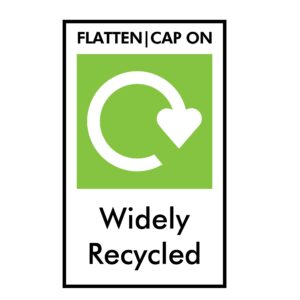
Flatten the packaging so less air is transported and more space is saved. Keep the cap on, as it can be recycled like the bottle.
Widely Recycled / Sleeve not yet recycled.
This product usually has two types of plastic (like a soft drink bottle), with one kind of plastic not being recyclable - in this case, the label - should be removed beforehand.
Download EPS/Vector
Download JPG
Widely Recycled at recycling centres.

These products aren't picked up from the curbside but can be disposed of at local recycling centres. Paint tins are a perfect example.
Widely Recycled / check locally for curbside.

Some types of packaging - such as tetra packs - can be recycled by some local authorities, but it is best to check first. They can usually be taken to household recycling centres.
Check locally

This recycling label is commonly found on specific types of plastic, this symbol means that between 20% and 75% of local authorities will collect and recycle it. You'll need to check with your local authorities for more information.
Not yet recycled

This symbol indicates that the product material is impossible to recycle, and fewer than 20% of local authorities across the UK will collect this packaging. Commonly seen on plastic carrier bags that have now been phased out in the UK.
Compostable seedling

A trademark owned by European Bioplastics, this symbol confirms that the packaging is industrially compostable according to European standard EN 13432.
Using this symbol requires written permission.
OK Compost

Denotes that the packaging is compostable in industrial waste recycling facilities in accordance with EN 13432: 2000 / EU packaging Directive ( 94/62/EEC). Inks, adhesives and additives are also recyclable.
OK Compost (home)

This symbol shows that the material can be composted in cooler and drier home facilities.
RESY
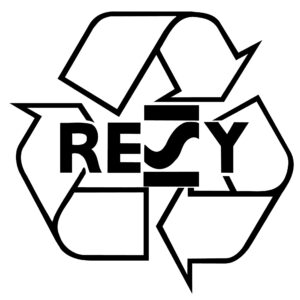
This licensed symbol denotes transit packaging product is made from recyclable corrugated packaging. Using this symbol requires written permission.
Glass

A reminder to use your glass household recycling bin or deliver it to a recycling point.
Aluminium

Seen on soft drink cans, indicating that the material is fully recyclable aluminium.
Steel

This type of packaging is manufactured from steel and can be recycled from your local recycling centre.
1: PETE

Polyethylene Terephthalate is arguably the most common plastic used for packaging (drink bottles, tubs, straws etc.). Recyclable.
2: HDPE
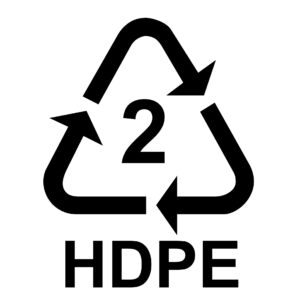
High-density polyethene. Found in milk bottles, toys and kitchenware. Generally recyclable.
3: PVC

Used in window frames, doors, wire insulation, piping, flooring and footwear. Not recyclable.
4: LDPE

Low-Density Polyethylene. Generally used in toys, squeezable plastic bottles and thin films over primary or tertiary packaging. Reusable, not recyclable.
5: PP

Polypropylene is often used for injection moulded and blow moulded products, like microwavable food containers, bottle caps, and packing tape. It can usually be recycled.
6: PS

This type of Polystyrene isn't recyclable in any way. It's seen in takeaway food packaging, insulation in the form of some types of peanut packaging and void filler, and CD/DVD cases.
7: Other

This category includes other types of plastic that don't fall into the previous groups (for example, BPA, polycarbonate, and LEXAN). These plastics are generally not recyclable.
Recycling logos on cardboard packaging
Cardboard is one of the most sustainable packaging materials on the market, and more businesses are shifting to sustainable packaging. More and more businesses are leaning on their sustainability credentials to appeal to a broader audience.
As a result, it's essential that you have a thorough understanding of precisely what these logos actually mean.

The following section will take a closer look at the symbols commonly seen and used on corrugated cardboard packaging.
This information will help you make the best decisions about which logos to use and educate your customers and their end users on the correct way to dispose of the packaging.
The looped recycling symbol
Undoubtedly, this symbol, the Mobius Loop, is one of the most recognisable logos of the 21st century.
Gary Andrews, an American designer, created the logo based on the three Rs - reduce, reuse and recycle.
The negative space creates the shape of a tree, while the rotating arrows that form a circular system symbolise continuity, eternity, and a sense of endlessness.

Today, the symbol is known as the international symbol for recycling.
It means that the material can be recycled in some way, shape or form, usually indicated by another recycling logo. The logo does not imply that the product has been made from recycled material.

A Mobius recycling logo with a numerical percentage figure in the middle denotes that the material is made from that percentage of recycled material.
OK Compost
The OK Compost symbol is the UK equivalent of the European Bioplastics Compost logo.
This symbol means that the packaging meets EN 13432: 2000 compliance and is safe to be disposed of in UK-based industrial composting facilities.

Anything with the OK Compost logo meets both UK and EU regulations for industrial compostability and visa versa.
OK Compost (Home)
The 'Home' version of the OK Compost logo was created to show that materials can safely be disposed of in at-home composting facilities.
The material will break down in controlled environments that are achievable at home, without industrial recycling centers.
Both industrial and at-home certifications require accreditation and certification. More information can be found here.
The Green Arrow Dot
This symbol is tricky, as it doesn't necessarily mean that the packaging is recycled or that it is capable of being recycled. It simply indicates that the producer has contributed to the creation and implementation of recyclable packaging practices.
The Green Dot symbol means that the manufacturer of that packaging has made a financial contribution to a national packaging recovery company that's in line with European Directive No. 94/62 and the corresponding federal law.

The logo is a protected trademark of PRO Europe, and a license is needed in order to use this symbol.
Having this symbol is mandatory in Germany, France, Portugal and Spain. In the rest of Europe, including the UK, it's an option.
When used, it must be placed on the most external packaging, or the packaging the consumer sees when the product is on the shelf.
FSC® - Forest Stewardship Council
Another widely recognised and well-respected logo is the FSC's tick tree. This symbol explains that the packaging is certified under the internationally recognised Forest Stewardship Council system.

This logo comes in many variations and can mean a range of things.
Some common meanings are that the packaging is made from:
- Responsibly managed virgin wood fibres
- Certified recycled materials
- A mixture of certified recycled and certified virgin fibres
Generally, the symbol means the packaging can be recycled in your at-home paper bin.
FSC itself promotes and certifies responsible forest management practices and approves the materials from these manages forests - mainly paper and wood.
All of Packhelp's products that are designed online come FSC certified, and you can place the logo on your packaging design in our online editor.
See more about Packhelp's cooperation with FSC.
European Bioplastics Compostable seedling
This logo, a registered trademark of European Bioplastics, denotes packaging industrially compostable according to the European standard EN 13432.

This means that when placed in the high heat, pressure and humidity (and times) of an industrial composting facility, the materials with break down and leave nothing but water, CO2 and biomass (dirt) behind.
Using this logo requires written permission. See more information about the usage guidelines here.
See Packhelp's range of biodegradable packaging
The UK's Widely Recycled
The range of 'Widely Recycled' logos indicates the percentage of local authorities in the UK that'll pick up this material up via household recycling collection and recycle it.
Putting this symbol on corrugated cardboard is an option, as more than 75% of local authorities will pick it up and recycle it.
Germany's RESY
The German packaging act has seen a drop in the use of single-use plastic packaging, and the RESY certification complements these recent changes.

RESY is a consortium of the union of paper producers. When you see this symbol, it means the corrugated cardboard packaging is recyclable and will be accepted at all facilities.
It's a logo that's seen mostly on tertiary or transit packaging, and while it's a German symbol, it's also seen and recognised in the UK.
Use of this logo requires certification and should be used alongside certifications from manufacturers, importers and other businesses in your supply chain. More information on the RESY website
Conclusion
In conclusion, the UK's recycling symbols are a great way to help ensure that your recycling efforts are successful. By becoming familiar with these symbols, you can help to make sure that your packaging is environmentally friendly and that your end customer can dispose of your packaging accordingly.

















